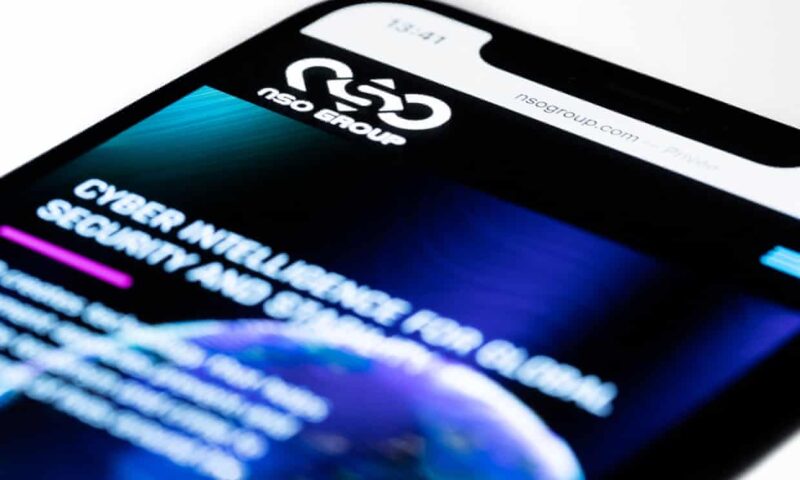Palestinian activists’ phones hacked by NSO spyware
Six Palestinian activists and some officials from the Palestinian foreign ministry had their phones hacked by Israeli military-grade spyware in the first known attack on Palestinian activists of this kind

The phones of six Palestinian human rights activists and foreign ministry officials were hacked using Israeli surveillance company NSO Group, in the first known case of Palestinian activists being targeted by military-grade Pegasus spyware.
Irish-based non-profit Frontline Defenders reported its findings in a joint technical report together with Amnesty International and the University of Toronto’s Citizen Lab on Monday, independently confirming the results.
A number of Palestinian Foreign Ministry employees whose identities have not yet been revealed were also victim to being hacked with spyware, The New Arab’s Arabic-language service Al-Araby Al-Jadeed reported.
Al-Haq Foundation revealed exclusively to Al-Araby Al-Jadeed that it discovered on October 16 that one of its employees, field researcher Ghassan Halaika, had his device hacked by the Pegasus program.
This prompted the Al-Haq to investigate and communicate with other Palestinian institutions targeted by Israel, and to examine some of its employees’ smartphones, especially those who used an iPhone.
Ubai Aboudi, a 37-year-old economist and US citizen who runs the Bisan Center for Research and Development in Ramallah was found to be hacked, along with lawyer Salah Al-Hammoury, who holds French citizenship.
Commenting on the hacking, Aboudi said he there was no “sense of safety” after experiencing the “dehumanising” hack of his personal phone, which contains photos of his family, including his three children.
His family “didn’t sleep from the idea of having such deep intrusions into our privacy”, he added.
He was especially concerned about eavesdroppers being privy to his communications with foreign diplomats. The researchers’ examination of Aboudi’s phone determined it was infected by Pegasus in February.
Aboudi accused Israel of “sticking the terrorist logo” on the groups after failing to persuade European governments and others to cut off financial support.
It’s not known precisely when or how the phones were breached, the security researchers said.
NSO Group ‘cannot be trusted’
Four of the six hacked iPhones exclusively used SIM cards issued by Israeli telecom companies with Israeli +972 area code numbers, said the Citizen Lab and Amnesty researchers. That led them to question claims by NSO Group that exported versions of Pegasus cannot be used to hack Israeli phone numbers. NSO Group has also alleged it does not target US numbers.
Sources told Al-Araby Al-Jadeed that it was easier to examine iPhone devices, leaving it more difficult to examine Android phones and other software.
Frontline Defenders considers Israel the main suspect behind the hacks. The first two intrusions were identified shortly after Israeli Defence Minister Benny Gantz declared the six Palestinian civil society groups as “terrorist” organisations.
The executive director of Frontline Defenders, Andrew Anderson, said the NSO Group cannot be trusted to ensure its spyware is not used illegally by its customers and says Israel should face international reproach if it does not bring the company to heel.
“If the Israeli government refuses to take action then this should have consequences in terms of the regulation of trade with Israel,” he said via email.
Mohammed Al-Maskati, the Frontline Defenders researcher who discovered the hacks, said he was first alerted on Oct. 16 by Halaika, whose phone was determined to have been hacked in July 2020. Al-Haq engages in sensitive communications with the International Criminal Court, among others, involving alleged human rights abuses.
“As human rights defenders living under occupation, we expect it was the (Israeli) occupation,” Halaika said when asked who he believed was behind the hack.
Pegasus spyware is notorious for being used against journalists, rights activists and political dissidents from Mexico to Saudi Arabia has been documented since 2015.
How to submit an Op-Ed: Libyan Express accepts opinion articles on a wide range of topics. Submissions may be sent to oped@libyanexpress.com. Please include ‘Op-Ed’ in the subject line.
- Tunisians protest against Maersk - November 25, 2024
- Gunman killed after shooting near Israeli embassy in Amman - November 24, 2024
- Kremlin: Russian weapons development kept under wraps - November 24, 2024


